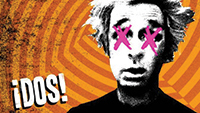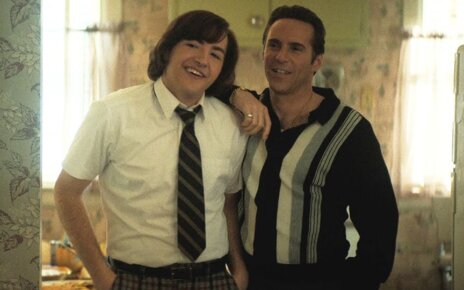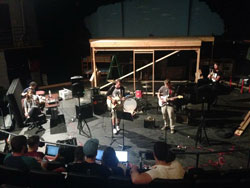Time sure flies, doesn’t it? It seems like it was less than two months ago that I was reviewing the last album from Green Day. Oh wait, it was less than two months ago.
Back in September, we saw the release of “¡Uno!”, an alleged “return to form” for Green Day that really just amounted to a mostly watered-down, sterilized attempt for the band to reclaim their glory years, with only a few worthwhile moments to be found. Ultimately, Green Day couldn’t live up to the hype.
Now we find ourselves in November, and with the release of “¡Dos!”, the second installment of their “epic” trilogy, we can finally look past the hype and judge the album for what it really is: an almost completely watered down, sterilized attempt for the band to reclaim their glory years, with even less worthwhile moments to be found.
I honestly can’t say that I was surprised by this outcome in the slightest, as “¡Dos!”, along with the soon-to-come “¡Tre!”, were produced during the same sessions that spawned “¡Uno!”, a marathon of sorts by Green Day to write as many sub-par power-pop songs as they possibly can. Unfortunately, this means that “¡Dos!” suffers from nearly all of the same problems found on “¡Uno!”, only now, after just going through this ordeal less than two months ago, it feels like insult to injury, like getting slapped on your already sunburned back.
“¡Dos!”, like its predecessor, presents itself as an endeavor to reclaim Green Day’s angsty, pop-punk glory through a collection of simpler rock songs that are bashed out effortlessly and efficiently. As one would imagine, however, Green Day doesn’t fail to disappoint by formulating many attempts throughout the album but never getting more than halfway there, again.
We certainly see a few noble attempts throughout “¡Dos!”, but for one reason or another even the most intense songs are stopped dead in their tracks from one of a number of culprits, whether it be the albums production, poorly planned song structures, or just from a good-old-fashion lack of chutzpah.
I almost feel as though it would be unnecessary to go through the albums production flaws again, as I would literally just be repeating myself word-for-word from my “¡Uno!” review. The tinny guitars, overly processed vocals, and “wind-up doll” rhythm section that Green Day insists on utilizing continue to make even the brawniest songs, like spitfire rager “Ashley” and the venom-tinged “Lady Cobra,” sound plastic lined and heavily padded rather than explosive and uncompromising like they should.
This production-based neutering is even more strongly seen on the track “Stop When The Red Light Flashes,” which builds up to be a promising punk jam, but quickly falls into this labored, mechanical pace that strips the track of all of its muscle. The unnecessary “woo-woo’s” (as if there weren’t enough of these in the last album) further add to the tracks shame.
Lyrics are another bewildering factor to consider. For instance, “Lazy Bones” sounds like the band’s attempt to re-write their classic track “Longview,” with lyrics detailing how they’re “too tired to be bored” and vice versa. This would be fine if it meant reflecting on those feelings from the perspective of 40-year-old men – which they are – but the fact that they’re actually trying to sound like disgruntled teenagers again just doesn’t work the same way, especially when it’s played with such passive force.
Surprisingly enough, the albums strongest tracks are the softer, more subtle songs (or at least as subtle as Green Day allow themselves to be) that book-end the album. Opener “See You Tonight” drifts smoothly along with little more than a delicately strummed guitar and Billy Joe Armstrong’s unassuming vocals, giving the song a classic, AM radio rock feel, while closing track “Amy,” though more than a bit sappy, offers a nice break from the groups poorly executed bombast. Though these tracks are far from great, they are easily the more likeable songs on the album.
These few forgivable tracks, however, could not even hope to make up for some of the albums biggest blunders, as they’re only more glaring this time around. For instance, if you were even slightly confused by “¡Uno!” single “Kill The DJ,” just wait until you get a load of “Nightlife,” a humiliating miscalculation from a band of aging pop-punk brats trying to be something resembling “sexy.” If Billy Joe Armstrong’s woozy, drugged out vocals aren’t already enough of a turn-off, then the putrid, obnoxious female rapping that compliments him will have you regretting that you even got that far into the album in the first place.
But don’t assume you’d have to sit through the whole album to find ridiculously unwarranted moments like this, as one of the albums most embarrassing excuses for a pop song waits right at track two. The song in question, entitled (here it comes) “F**K Time,” is laughable before you even start the track, but it only gets worse once you press the start button. I still can’t decide if this song, with a chorus that goes “Oh baby baby it’s f**k time / I really really wanna make you mine,” is trying to be edgy or just funny, but either way, I doubt anyone will be doing anything by laughing at them, not with them.
In the end, listening to “¡Dos!”, especially after just digesting their last release, feels more like a bad case of déjà vu rather than the fun power pop romp it’s trying so hard to be. It ultimately raises one simple question: Why is all of this necessary, Green Day? Did you really think you had three albums worth of such awesome, or even decent material that it was integral that they all get released, or is this just another over-ambitious stunt?
Unfortunately, I don’t have the answer to this, but I can assure you that I’m certainly not banking on “¡Tre!” to save the day.
IMAGE TAKEN from basedonnothing.com




